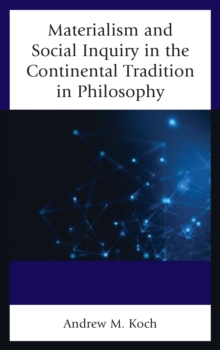Description
| Product ID: | 9781498551717 |
| Product Form: | Paperback / softback |
| Country of Manufacture: | US |
| Title: | Materialism and Social Inquiry in the Continental Tradition in Philosophy |
| Authors: | Author: Andrew M. Koch |
| Page Count: | 158 |
| Subjects: | Political science and theory, Political science & theory |
| Description: | This book examines the evolution of materialism within the continental tradition in philosophy. After building a model of materialism, it shows how the writings of Kant, Marx, Weber, and Nietzsche have contributed to a materialist understanding of culture and history. The continental tradition in philosophy has gotten more “materialistic” over the last two hundred years. This has resulted from a combination of some very specific moves with regard to the epistemological parameters of understanding and the assertion that ideas may have material force in history. Therefore, the materialism within the continental tradition is not a materiality of being, but a materiality of understanding and action. Such an inquiry opens up space between the activities of sensation and the mental faculty of cognition. ‘I think, therefore I am,’ is not an empirical statement, but a statement of cognition. It is assumed that this distinction is at the core of continental philosophy. Cognition is always interpretive. Experience is the start of cognition, but not its final product. Our cognitions cannot be separated from our experience of the physical, social, and cultural environment around us. The symbolic nature of language reinforces the interpretive nature of our thoughts and ideas. Our language is, therefore, always projecting an implicit image of the world. Language is, therefore, always political. The materiality of these cognitive world-views is manifested in two ways. First, in their formation. They are the products of sensual contact with the world. Second, in their effects. They move people. It is a picture of the world which serves to shape the content and character of human behavior. Whether we want to call these phantoms of the mind, world-view, ideas, thoughts, cognitions, or any other term, the dual character of their materiality is secure. This work examines the threads materialist ideas running through the efforts of some major authors in the continental tradition in philosophy. A model of materialism is constructed in Chapter One and used to assess the materialist elements in works from Kant, Marx, Weber, Nietzsche, and contemporary poststructuralism. The work demonstrates the evolution of materialist thinking within the tradition and asserts an evolving and developing articulation of materialism in relation to the thoughts and activities of human beings. |
| Imprint Name: | Lexington Books |
| Publisher Name: | Lexington Books |
| Country of Publication: | GB |
| Publishing Date: | 2020-02-11 |


